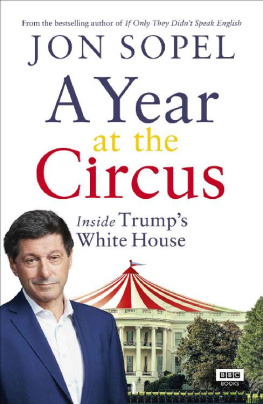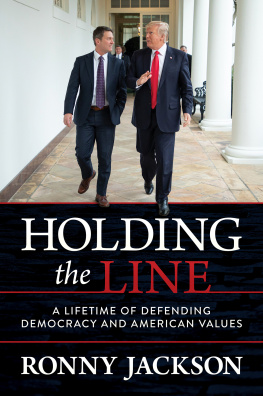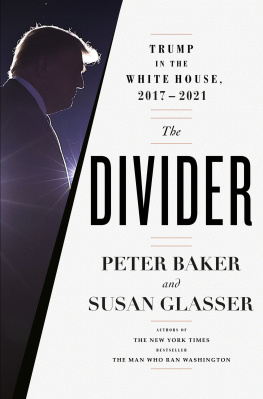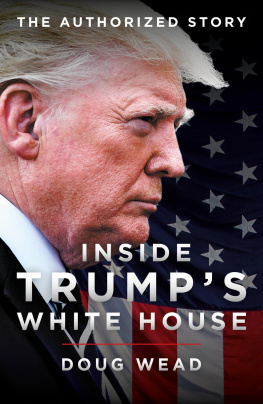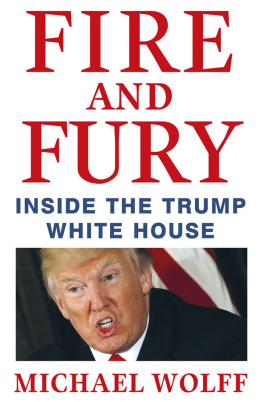JON SOPEL
A Year at the Circus

Contents
About the Author
Jon Sopel has been the BBCs North America Editor since 2014. He has covered the 2016 election and Trumps White House at first hand, reporting for the BBC across TV, radio, and online. As a member of the White House Press Corps, he has accompanied both President Obama and President Trump on Air Force One and interviewed President Obama at the White House. He has travelled extensively across the US and recently rode a Harley Davidson down the West Coast (that wasnt for work though). He lives in Washington and London.
He is the author of the If Only They Didnt Speak English: Notes from Trumps America.
To Rosalind, my wonderful sister
Foreword
One of the things about covering the Trump White House is just how much is going on all the time objects flying towards you 24/7, ceaseless noise, constant activity. It is exciting and relentless and occasionally exhausting. But the frustration for most of us covering these events is how much goes unreported. My main outlet as the BBCs North America Editor is the Ten OClock News in the UK. That will on average contain eight to ten of the most important and interesting stories from around the world that day. If I am to find a berth in the running order, it is going to be on the one stand-out event.
That never does justice to all the stories that dont quite pass the threshold of being globally significant but which, nonetheless, are fascinating. So, when BBC Books asked me to come up with an idea to follow on from If Only They Didnt Speak English, my first thought was to try to find a mechanism to report some of the untold gems of this unique administration. That is what I have tried to do in the pages that follow. And thanks to my publisher Yvonne Jacob (and publicist Claire Scott and copy editor Steve Dobell) and literary agent Rory Scarfe for their support. Likewise Malcolm Balen in the BBC for his input.
In this endeavour I have to single out Ron Christie. He is our in-house BBC analyst on this administration. He served with distinction in the Bush White House, runs his own political consultancy and as well as being a Republican strategist also finds time to teach at Georgetown University and NYU. He also somehow found time to read my manuscript. And all I can say is lucky, lucky students to be taught by him. His incisive intellect picked up on any number of sloppy judgements, half-baked assumptions, weak arguments and occasional inaccuracies. And like all great teachers he managed to point all this out while being immensely encouraging too. Any errors that remain are entirely down to me.
There are three other people I need to thank. In Washington we seem to have an astonishing procession of super-talented young Americans coming into the bureau, straight out of college three of the best are Morgan Gisholt Minard, Cosima Schelfhout and Aiden Johnson: brilliant minds, good fun to have around, great colleagues with an unbelievable work ethic. I have no idea what they will end up doing but I am sure they have stellar futures ahead of them. I am only grateful they found some time to help with vital bits of research and fact checking on this book.
One other shout-out: Jonathan Csapo is the logistics maestro of the office, and I cannot imagine how my life would function without him.
And last but certainly not least, my wife, Linda, for her constant encouragement and enthusiasm for this latest project; oh, and Alfie our miniature German Schnauzer editorially he is still weak, but for companionship he is an A+: never complaining about going for long walks when my mind became a mushy mess and needed to be cleared; and just as happy to doze for hours on the sofa in my study while I wrote.
Jon Sopel
Washington, July 2019
Introduction
It is 12 July 2018, and President Trump on a baking hot day has a much anticipated joint news conference with Theresa May at her official country house, Chequers, in the rolling Buckinghamshire hills. Much anticipated, because, the night before, Donald Trump has given a scabrous, freewheeling interview to the Sun newspaper, criticising Theresa May over her handling of Brexit, warning that America wouldnt be much interested in a trade deal with Britain if it was still in some way yoked to the EU, and then to add a good sprinkling of chilli powder onto an open wound, went on to say that Boris Johnson would make a very good prime minister. Well, if that was a game of darts in your local pub, those three barbs would have the scorer calling out one hundred and eighty. Unerring darts, Donald.
Except he probably hadnt meant it, or at least hadnt calculated the fall-out. But this was day three of a tour which had already seen the US president clash with the leaders of NATO over the resistance of many member states to paying 2 per cent of their GDP into the collective security coffers. And while he was in Brussels he got into a fight with the leaders of the EU over trade. And then he came to London and gave Theresa May a mauling. In this topsy-turvy world, the President was going on to Helsinki in Finland on the last stop on his tour to hold a one-to-one summit with the Russian leader Vladimir Putin, which he predicted would be the easiest leg of his journey. The Trump circus was on the move.
But back to the news conference on the parched, dun-coloured lawn of Chequers. In a heatwave summer, Mrs May was feeling distinctly cool towards her visitor. And he knew it. He was in full contrition mode. At their private talks before they met the press, he was behaving as a man who knew he was in trouble. Gushing in his admiration for Theresa May, saying this time, and in contradiction of the Sun interview, there could still be a trade deal. One of those present told me that unlike on previous occasions, he listened attentively to what she had to say. No interruptions. No changing the subject and cutting her off. And he complained that the newspaper had not published all the flattering things hed said about her.
This he repeated at the news conference. Repeatedly. From Chequers he was going on to meet the Queen at Windsor Castle and, from there, up to Turnberry for the weekend to play the championship golf course that bears his name. And then he started talking about the vote to leave the European Union, and the last time hed been in Britain.
If you remember I was opening Turnberry the day before Brexit, he told us. They all showed up [the journalists covering the trip, myself included] on the ninth hole, overlooking the ocean, and I said Whats going on? and all they wanted to talk about was Brexit.
They asked for my opinion and I think you will agree I said Brexit will happen, and it did happen. Then we cut the ribbon.
The reason I felt it was going to happen was because of immigration. One of the reasons I got elected was because of immigration, I felt that Brexit had the upper hand, and most people didnt agree with me.
I am now listening intently, wondering whether I have misheard. As I say, I was at Turnberry with the then Republican hopeful for the presidency those unforgettable few days in June 2016. He wasnt there the day before Brexit. He didnt stand on the ninth tee and predict the result of the next days vote. People didnt disagree with his forecast. And the reason that nothing of the kind like that happened was that Donald Trump didnt arrive in Scotland until 24 June, the day after the Brexit vote. It is a claim he would repeat again at length.
So onto Twitter I went and rather clumsily and hurriedly wrote this: Bizarre. @realDonaldTrump says he came to Turnberry the day before Brexit and he told everyone that he thought Brexit would happen. And that he predicted correctly what would happen the next day. Umm. Not true. He came the day after Brexit. I was there. June 24.

